Still here

Still here, but the odds were not really against it. Things tend to quiet down sooner or later and then I allow myself the luxury of doing things which I find creatively satisfying. While neglecting this blog I was learning other things, mostly about people, and I’ll leave it at that. I have also found myself in the delightful situation of reading multiple books at the same time. From Karen Armstrong’s The Great Transformation to Elizabeth Gaskell’s Cranford, it’s a wonderful, if self-indulgent, place to be for one striving to be literate. My recent acquisition of a Sony eBook reader certainly has a lot to do with that. So, yes, I have been reading, just not writing, and I have some catching up to do in the blogging department.
I do have a few books wrapped up and ready to be blogged. I’ll be writing about these in the coming weeks. The short version of the reviews: I loved them all.
In the meantime, how about a full-length movie? Yes, it’s Jane Austen—Ang Lee’s 1995 award-winning film, Sense and Sensibility, Oscar-winning screenplay written by Emma Thompson, who also co-starred in the film with Kate Winslet. It’s free and it’s legal. For now, it’s available only to U.S. audiences. Courtesy of Hulu.
Or how about something from Emily Dickinson? I can’t lose either way. From c. 1858:
It’s all I have to bring today —
This, and my heart beside —
This, and my heart, and all the fields —
And all the meadows wide —
Be sure you count — should I forget
Some one the sum could tell —
This, and my heart, and all the Bees
Which in the Clover dwell.
On death and Austen: The power of words
Reading Austen’s letters has always been a source of much-anticipated pleasure and entertainment for me. A while back, I came across one particular letter which easily became one of my favorites. This letter, though, was a somber one. It was written by Austen to her cousin, Philadelphia Walter, on April 8, 1798. Philadelphia’s father, William-Hampson Walter, had just died, and it was a letter of condolence. I note that Austen was twenty-two years of age when she wrote it. Here is the content of the letter, a short one:
Steventon Sunday April 8th
My dear Cousin
As Cassandra is at present from home, You must accept from my pen, our sincere Condolance on the melancholy Event which Mrs Humphries Letter announced to my Father this morning.——The loss of so kind & affectionate a Parent, must be a very severe affliction to all his Children, to yourself more especially, as your constant residence with him has given you so much the more constant & intimate Knowledge of his Virtues.——But the very circumstance which at present enhances your loss, must gradually reconcile you to it the better;——the Goodness which made him valuable on Earth, will make him Blessed in Heaven.——This consideration must bring comfort to yourself, to my Aunt, & to all his family & friends; & this comfort must be heightened by the consideration of the little Enjoyment he was able to receive from this World for some time past, & of the small degree of pain attending his last hours.——I will not press you to write before you would otherwise feel equal to it, but when you can do it without pain, I hope we shall receive from you as good an account of my Aunt & Yourself, as can be expected in these early days of Sorrow.——
My Father & Mother join me in every kind wish, & I am my dear Cousin,
Yours affec:tely
Jane Austen
Miss Walter
Seal
Sevenoaks
Kent
I love this letter, for its kindness and generous compassion. For its logic and its eloquence. And I love it for the comfort it must have brought its recipient.
You see, my Mom died a couple of months ago. Losing my Mom has been the most painful experience of my life. And because I have never been, and will never be, as wise and self-denying as my Mom, I have plenty of regrets. Thank you, Mom, for everything, which is a lot of good–more good than I can ever hope to do in my life. You did very well, and I miss you. So much.
Re-reading Austen’s letter, I’d like to imagine the comfort that Philadelphia probably felt upon reading it during her time of grief. I, for one, would have welcomed a letter like it.
Lovers’ Vows
My Chapman edition of Jane Austen’s Mansfield Park included the play Lovers’ Vows by Mrs. Inchbald. I read Mansfield Park last month, and I thought it would be fun and interesting to read Lovers’ Vows, which Austen had made a big part of the plot in Volume I of the novel. I was also curious why Austen did include this particular play as part of the plot. Well, reading the play did turn out to be fun; in fact, I thought Mrs. Inchbald’s Lovers’ Vows was hilarious! (Recall that the amateur actors of Mansfield required that the play for their production be both tragedy and comedy.)
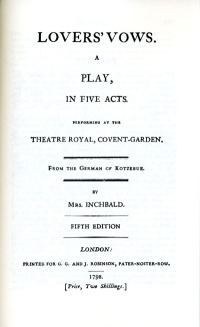 The play is short—it’s only 60 pages long in the small, close print of the Chapman edition. Lovers’ Vows is an English adaptation of a German play, Natural Son, by Kotzebue. Chapman confirms that the adaptation by Mrs. Inchbald is the Lovers’ Vows of Mansfield Park: The line which was to have been Edmund Bertram’s, “When two sympathetic hearts meet in the marriage state, matrimony may be called a happy life,” was in Mrs. Inchbald’s version; and Count Cassel’s speeches numbered just “two-and-forty.” Chapman further reports that, “Lovers’ Vows had a great vogue and was frequently reprinted.”
The play is short—it’s only 60 pages long in the small, close print of the Chapman edition. Lovers’ Vows is an English adaptation of a German play, Natural Son, by Kotzebue. Chapman confirms that the adaptation by Mrs. Inchbald is the Lovers’ Vows of Mansfield Park: The line which was to have been Edmund Bertram’s, “When two sympathetic hearts meet in the marriage state, matrimony may be called a happy life,” was in Mrs. Inchbald’s version; and Count Cassel’s speeches numbered just “two-and-forty.” Chapman further reports that, “Lovers’ Vows had a great vogue and was frequently reprinted.”
In the preface, Mrs. Inchbald says that she made modifications to the play in order to adapt it to the “English rather than the German taste.” Regarding the character of Amelia (played by Mary Crawford), Mrs. Inchbald says, “The part of Amelia has been a very particular object of my solicitude and alteration: the same situations which the author gave her remain, but almost all the dialogue of the character I have changed: the forward and unequivocal manner in which she announces her affection to her lover, in the original, would have been revolting to an English audience.” Also, the character of the Butler was modified so that he preferred to speak in rhyme and verse rather than prose, thus the reference to the “rhyming Butler” in the novel. The effect is simply funny.
A summary of the plot of Lovers’ Vows follows, but one really needs to read the actual play to appreciate the humor. First, the dramatis personae—after reading the play, one realizes that Austen’s casting was perfect:
- Baron Wildenhaim . . Mr. Yates
- Count Cassel . . . Mr. Rushworth
- Anhalt . . . . . Edmund Bertram
- Frederick . . . . Henry Crawford
- Verdun the Butler . . Tom Bertram
- Cottager . . . . Tom Bertram
MEN:
- Agatha Friburg . . . Maria Bertram
- Amelia Wildenhaim . . Mary Crawford
- Cottager’s wife . . Mrs. Grant (turned down by Fanny Price)
WOMEN:
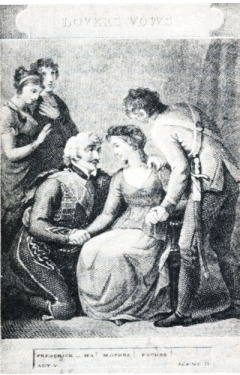 Lovers’ Vows is set in Germany, and the entire play takes place in the short span of a day. Frederick is a German soldier who has come home from war on a leave of absence, and is eager to see his beloved mother, Agatha, after an absence of five years. By happenstance, he meets his mother by a country road, starving and almost dying. In this bittersweet moment of seeing each other again after a long absence, and the discovery of the tragic circumstances of Agatha, it is revealed to Frederick by his mother that he is an illegitimate son and that his father is Baron Wildenheim. Twenty years ago, the young would-be Baron seduced Agatha, who was a poor country girl taken in by his mother. Being young and fearful of his mother’s wrath (it’s all about money), and promising Agatha marriage upon his mother’s death, Wildenheim prevailed on Agatha not to reveal to anyone that he was the father of the child she was carrying. Of course, this meant that Agatha was banished from the Wildenheim castle by her own benefactress. Wildenheim, at the same time went off to France, married well, and had a daughter, named Amelia Wildenheim.
Lovers’ Vows is set in Germany, and the entire play takes place in the short span of a day. Frederick is a German soldier who has come home from war on a leave of absence, and is eager to see his beloved mother, Agatha, after an absence of five years. By happenstance, he meets his mother by a country road, starving and almost dying. In this bittersweet moment of seeing each other again after a long absence, and the discovery of the tragic circumstances of Agatha, it is revealed to Frederick by his mother that he is an illegitimate son and that his father is Baron Wildenheim. Twenty years ago, the young would-be Baron seduced Agatha, who was a poor country girl taken in by his mother. Being young and fearful of his mother’s wrath (it’s all about money), and promising Agatha marriage upon his mother’s death, Wildenheim prevailed on Agatha not to reveal to anyone that he was the father of the child she was carrying. Of course, this meant that Agatha was banished from the Wildenheim castle by her own benefactress. Wildenheim, at the same time went off to France, married well, and had a daughter, named Amelia Wildenheim.
Mansfield Park by Jane Austen
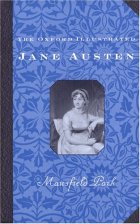 Having read the other five of Austen’s novels, I thought I had gained enough immunity, and was safe against an attack from Austen’s writing style and substance while I was reading Mansfield Park. But I was helpless. I was once again charmed, even more so than before, if you can believe it possible. I cannot possibly put all my thoughts in this post—it would be too long—for Austen gave me a lot to think about in this book. But here are some highlights.
Having read the other five of Austen’s novels, I thought I had gained enough immunity, and was safe against an attack from Austen’s writing style and substance while I was reading Mansfield Park. But I was helpless. I was once again charmed, even more so than before, if you can believe it possible. I cannot possibly put all my thoughts in this post—it would be too long—for Austen gave me a lot to think about in this book. But here are some highlights.
Among Austen’s novels, Mansfield Park, in my opinion, is the one which presents the deepest insight and knowledge of the nuances and vicissitudes of human nature, and it presents them masterfully. In it, Austen pays tribute to a sound mind, judgment, and principles, as the compass which can safely guide us through the changes of time and circumstances. Never mind that the person who possesses these traits cannot play the pianoforte or the harp. Austen gives the young heroine, Fanny Price, a knowledge of these things. When Edmund Bertram, her cousin and secret love, promises to write to her when he has news of success in pursuing his own love, Mary Crawford, Fanny thinks:
For this letter she must try to arm herself. That a letter from Edmund should be a subject of terror! She began to feel that she had not yet gone through all the changes of opinion and sentiment, which the progress of time and variation of circumstances occasion in this world of changes. The vicissitudes of the human mind had not yet been exhausted by her.
Austen emphasizes the importance of proper upbringing and education in shaping an individual’s character, judgement, and principles, whether this education is supplied by a natural or an adoptive family. But she also acknowledges that a favorable disposition and judgement can be innate, if struggling to prevail, as in the case of Mary Crawford and Susan Price, Fanny’s younger sister.
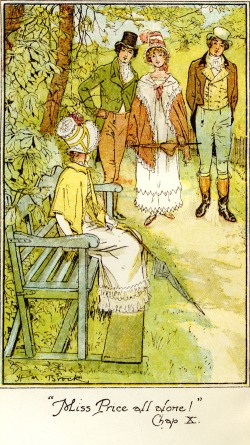 I have this impression—though I might be wrong—that among Austen’s heroines, Fanny Price is the least liked. I love Fanny Price. Austen’s Miss Price is painfully shy, delicate, quiet, nervous, and an introvert, who derives her pleasures from books, riding, sitting and keenly observing, and the company of her cousin, mentor, and confidant, Edmund. Fanny Price also seems to be the Austen heroine whose colour changes the most—she is constantly turning scarlet or white, but mostly scarlet. She is also the most prone to almost, but not quite, faint, as if Austen is gently teasing her for her delicacy, which she also does in other ways at some points in the novel. Yet these are the words which Austen uses over and over again in the novel in their variety, as if the reader cannot be reminded enough, in relation to Fanny: gentle, sweet, tender, good, modest, soft; and with purity of mind and intentions, excellence of principles, an affectionate heart, tenderness of heart, a quick and clear understanding, mental superiority, the heart which knew no guile; and with beauty of face and figure to boot. Henry Crawford, Mary’s brother and a character that I was wholly prepared to hate until Austen botched my plans, says to Fanny:
I have this impression—though I might be wrong—that among Austen’s heroines, Fanny Price is the least liked. I love Fanny Price. Austen’s Miss Price is painfully shy, delicate, quiet, nervous, and an introvert, who derives her pleasures from books, riding, sitting and keenly observing, and the company of her cousin, mentor, and confidant, Edmund. Fanny Price also seems to be the Austen heroine whose colour changes the most—she is constantly turning scarlet or white, but mostly scarlet. She is also the most prone to almost, but not quite, faint, as if Austen is gently teasing her for her delicacy, which she also does in other ways at some points in the novel. Yet these are the words which Austen uses over and over again in the novel in their variety, as if the reader cannot be reminded enough, in relation to Fanny: gentle, sweet, tender, good, modest, soft; and with purity of mind and intentions, excellence of principles, an affectionate heart, tenderness of heart, a quick and clear understanding, mental superiority, the heart which knew no guile; and with beauty of face and figure to boot. Henry Crawford, Mary’s brother and a character that I was wholly prepared to hate until Austen botched my plans, says to Fanny:
“You have qualities which I had not before supposed to exist in such a degree in any human creature. You have some touches of the angel in you, beyond what—not merely beyond what one sees, because one never sees any thing like it—but beyond what one fancies might be.”
Even Austen the narrator, at the end of the novel, refers to the heroine as “My Fanny,” which I think is a rare public display of fondness for one of her heroines. And yet, Fanny is all too human. When Edmund and Mary have a lovers’ spat at a ball, this is how Fanny reacts:
Fanny, not able to refrain entirely from observing them, had seen enough to be tolerably satisfied. It was barbarous to be happy when Edmund was suffering. Yet some happiness must and would arise, from the very conviction, that he did suffer.
Sir Walter Scott’s Review of Emma
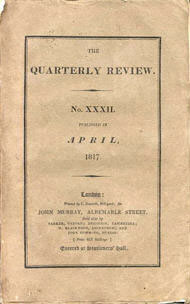 What can I say? I was curious. I have often read about this famous “flattering” review that Sir Walter Scott—author of Ivanhoe, The Lady of the Lake, and many others—wrote about Austen’s Emma, but I’ve never really read excerpts from that review, which appeared in the October 1815 edition (published on 12 March 1816) of The Quarterly Review. So I went in search of the article so I can read it myself. It wasn’t straightforward to find a digital copy online—to my surprise—but I eventually found one reproduced in the book Famous Reviews, edited by R. Brimley Johnson (London, 1914). Hooray for Project Gutenberg! Here are some excerpts from Scott’s review, which I’ve also posted on this blog’s The Pages (see sidebar).
What can I say? I was curious. I have often read about this famous “flattering” review that Sir Walter Scott—author of Ivanhoe, The Lady of the Lake, and many others—wrote about Austen’s Emma, but I’ve never really read excerpts from that review, which appeared in the October 1815 edition (published on 12 March 1816) of The Quarterly Review. So I went in search of the article so I can read it myself. It wasn’t straightforward to find a digital copy online—to my surprise—but I eventually found one reproduced in the book Famous Reviews, edited by R. Brimley Johnson (London, 1914). Hooray for Project Gutenberg! Here are some excerpts from Scott’s review, which I’ve also posted on this blog’s The Pages (see sidebar).
Scott starts by discussing the value of a novel, even mediocre ones, but acknowledges that Austen’s Emma, as well as Sense and Sensibility and Pride and Prejudice, were not your run-of-the-mill novels:
If such apologies may be admitted in judging the labours of ordinary
novelists, it becomes doubly the duty of the critic to treat with
kindness as well as candour works which, like this before us, proclaim a
knowledge of the human heart, with the power and resolution to bring
that knowledge to the service of honour and virtue. The author is
already known to the public by the two novels announced in her title-page,
and both, the last especially, attracted, with justice, an
attention from the public far superior to what is granted to the
ephemeral productions which supply the regular demand of watering-places
and circulating libraries. They belong to a class of fictions which has
arisen almost in our own times, and which draws the characters and
incidents introduced more immediately from the current of ordinary life
than was permitted by the former rules of the novel.
As the last sentence of this quote indicates, there was at that time occurring a transormation of the novel from one which related sensational, overly sentimental, impossible schemes and tones to one which realistically reflected ordinary life and ordinary people. Does this remind you of anything? Reading the first half of Scott’s article, I was continually reminded of Austen’s Northanger Abbey, which was written around 16 years before the review (but published posthumously). In light of the first sentence of the next excerpt, I find this very interesting! Check it out: (more…)
Motivations, or why I started this blog (Part II)
So, to continue where I left off in my first post, I finished reading Emma with a sense of satisfaction which no other novel had given me. (I note here that I can honestly say that, until about a couple of months ago, I had not been aware of the current fascination with Austen in the popular culture.) Months after Emma, I found myself at the same indie bookstore grabbing every Penguin edition Austen novel that they had on the shelves—they had all that I needed except Mansfield Park. Do you sometimes envy people who are about to read for the first time your favorite books, knowing the hours of pleasure that were ahead of them in reading those books? I now had in my possession four additional Austen novels, none of which I knew anything about, except what was written on the back covers which, thankfully, didn’t give anything away. I didn’t know then what I was in for.
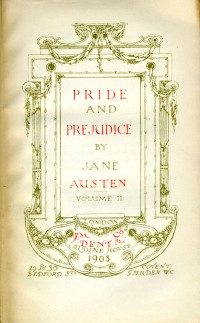 I started with Pride and Prejudice. The thing had me rolling on the floor laughing. Emma notwithstanding, I was surprised, I really was. At the sharp wit, the beautiful writing, the humor, the delicacy, the storytelling, the vividness of the characters, the truths that were told. Everything. I couldn’t believe that here was a writer from the early 19th century who connected at different levels with a 21st-century, hard-to-impress scientist who used to think that reading fiction was a complete waste of time. I find that utterly amazing. At around this time, it also became clear to me that Austen was a literary genius. And the fact need not be diluted. Austen was a genius like Einstein was a genius.
I started with Pride and Prejudice. The thing had me rolling on the floor laughing. Emma notwithstanding, I was surprised, I really was. At the sharp wit, the beautiful writing, the humor, the delicacy, the storytelling, the vividness of the characters, the truths that were told. Everything. I couldn’t believe that here was a writer from the early 19th century who connected at different levels with a 21st-century, hard-to-impress scientist who used to think that reading fiction was a complete waste of time. I find that utterly amazing. At around this time, it also became clear to me that Austen was a literary genius. And the fact need not be diluted. Austen was a genius like Einstein was a genius.
After Pride and Prejudice, I was under Austen’s spell. I had no sooner finished Pride and Prejudice than I was reaching for the next novel. In quick succession, I read Persuasion, Northanger Abbey, and Sense and Sensibility, each becoming a favorite as I read it. As I read, it also became clear that Austen was a very well-read person. I also convinced myself that she was, in today’s jargon, a sort of feminist. I was very, very impressed, to say the least. I was hooked. I wanted to learn more about this genius. I started reading her letters. But that’s another story.
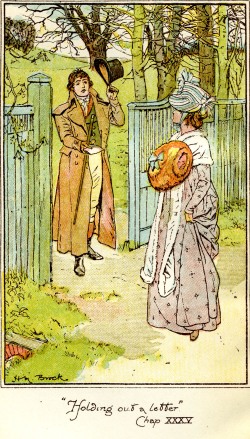 That’s how I found myself at this point, wanting to spend the rest of my life reading. By reading Austen, I have been inspired to read again, to strive to be literate. To read not just prose, but also poetry. Before Austen, I didn’t care a hoot about poetry. Now I even manage to memorize them, and seek them. And, yes, I was wrong. Reading fiction, very good fiction, is not a waste of time. I do learn something—not all new—about myself, about others, about the human condition, about possibilities. And, dare I say, universal truths? 😉
That’s how I found myself at this point, wanting to spend the rest of my life reading. By reading Austen, I have been inspired to read again, to strive to be literate. To read not just prose, but also poetry. Before Austen, I didn’t care a hoot about poetry. Now I even manage to memorize them, and seek them. And, yes, I was wrong. Reading fiction, very good fiction, is not a waste of time. I do learn something—not all new—about myself, about others, about the human condition, about possibilities. And, dare I say, universal truths? 😉
I sometimes wonder if my experience is strange. But, perhaps, it is just another measure of Austen’s genius and, perhaps, I am not alone.
Those who have read Northanger Abbey will recognize the title I have chosen for this nascent blog and, after reading this and my first post, will perhaps understand why I chose it. I’ll end by quoting the relevant text from the novel:
“I am no novel reader—I seldom look into novels—Do not imagine that I often read novels—It is really very well for a novel.”—Such is the common cant.— “And what are you reading, Miss —?” “Oh! it is only a novel!” replies the young lady; while she lays down her book with affected indifference, or momentary shame.— “It is only Cecilia, or Camilla, or Belinda;” or, in short, only some work in which the greatest powers of the mind are displayed, in which the most thorough knowledge of human nature, the happiest delineation of its varieties, the liveliest effusions of wit and humour are conveyed to the world in the best chosen language.
(The illustration in this post is by H. M. Brock, for Pride and Prejudice.)
I welcome your comments.
Motivations, or why I started this blog (Part I)
The reason I started this blog can be summarized as follows: Jane Austen. It doesn’t mean, though, that this is a blog about Jane Austen and her work, though that will no doubt be a big part of it. Let me explain.
I am a professional scientist. You can imagine what getting to be called such probably entailed: Graduate school, lots of all-nighters, sleeping in libraries, lots of reading and studying. Yes, I read a lot, but the kind of books I read were obviously technical and scientific in nature, with as much equations as text in them. I had been fond of books as a child. For this I have my family to thank, for raising me in an environment full of books and newspapers. The books were varied, from children’s books to grammar books, chemistry books, complete sets of encyclopedias, medical books, the Pentagon Papers, bibles, big, fat dictionaries, sundry novels, etc. (Alas, no Austen.) Wanting to be a scientist early on, I was eventually drawn more and more to science books—books which contained mankind’s collective knowledge about the Universe. My education in literature, in the other kind of books, was virtually stunted and, until recently, I thought I suffered no great loss from it. Indeed, while in graduate school, I decided that reading fiction was a complete waste of time, because nothing was to be learned from reading such books.
Fast forward to about a year ago. No longer in graduate school and things going well with my research work, I found myself with some expendable time. I guess I began to be envious of people who read, and was embarrassed that I couldn’t call myself a reader. While in an indie bookstore, I picked up a used copy of Austen’s Emma without knowing what the story was about. I had read that Austen was a great writer. If there is any doubt in the reader’s mind that I am illiterate, then that last sentence should erase any trace of it.
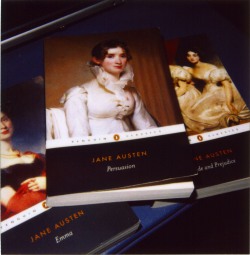 In the comfort of home, I proceeded to read Emma. At first, the 19th-century language slowed me down, but it didn’t make me put down the book. (This is an appropriate place to say that I have a short attention span.) The storytelling compelled me to turn each page, and the language eventually gained a rhythm with each page I read, and the rhythm stuck. Around the middle of the book, I began to realize what I was actually reading, and the realization sent a rush of blood to my head, and words of awe from my mouth. I had to pause in disbelief. I realized that before me were words that were strung together into sentences to convey a meaning in a way that was absolutely beautiful and subtle. I realized that I understood what Austen was saying at a much deeper level than what the words and sentences seemed to be conveying at the surface. It was like I was reading feelings and thoughts instead of words. If that doesn’t make much sense, it’s because I am at a loss as to how to describe the experience. Perhaps I should just say that the experience, the realization, was profound.
In the comfort of home, I proceeded to read Emma. At first, the 19th-century language slowed me down, but it didn’t make me put down the book. (This is an appropriate place to say that I have a short attention span.) The storytelling compelled me to turn each page, and the language eventually gained a rhythm with each page I read, and the rhythm stuck. Around the middle of the book, I began to realize what I was actually reading, and the realization sent a rush of blood to my head, and words of awe from my mouth. I had to pause in disbelief. I realized that before me were words that were strung together into sentences to convey a meaning in a way that was absolutely beautiful and subtle. I realized that I understood what Austen was saying at a much deeper level than what the words and sentences seemed to be conveying at the surface. It was like I was reading feelings and thoughts instead of words. If that doesn’t make much sense, it’s because I am at a loss as to how to describe the experience. Perhaps I should just say that the experience, the realization, was profound.
I will continue this personal story, and the motivations for this blog, on my next post. I welcome your comments.
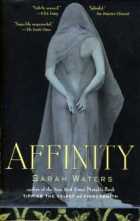
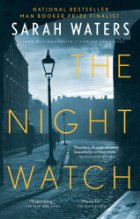
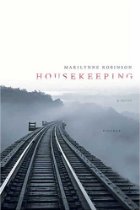
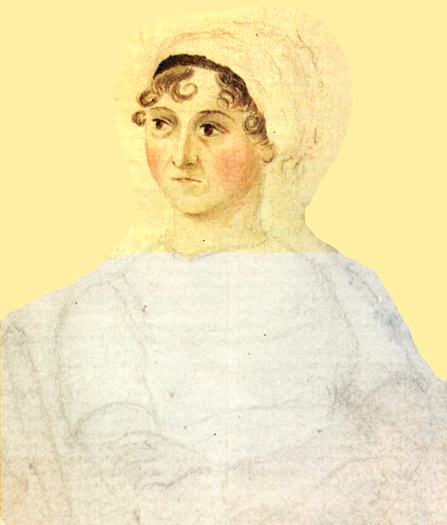


7 comments